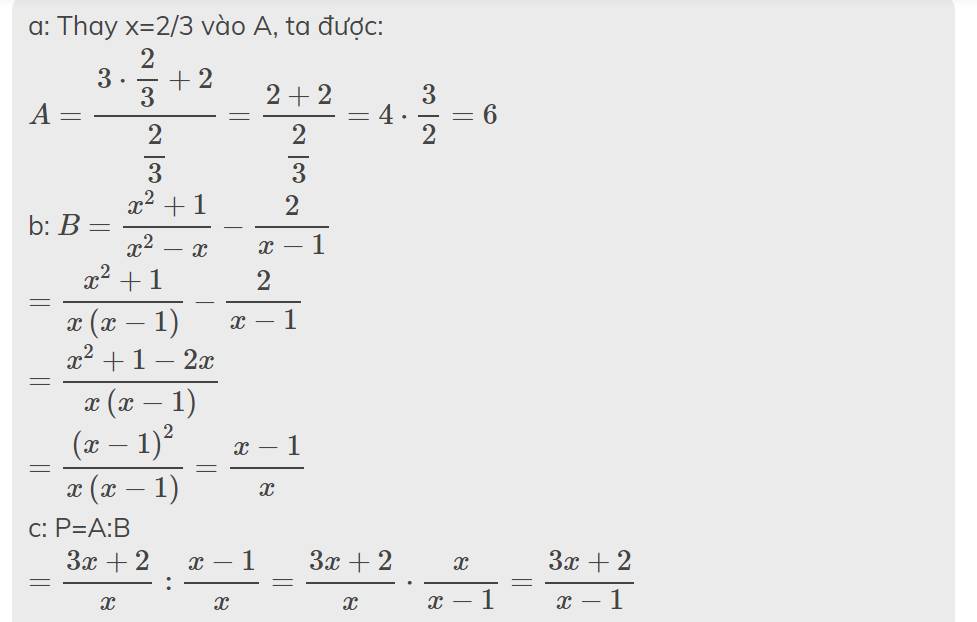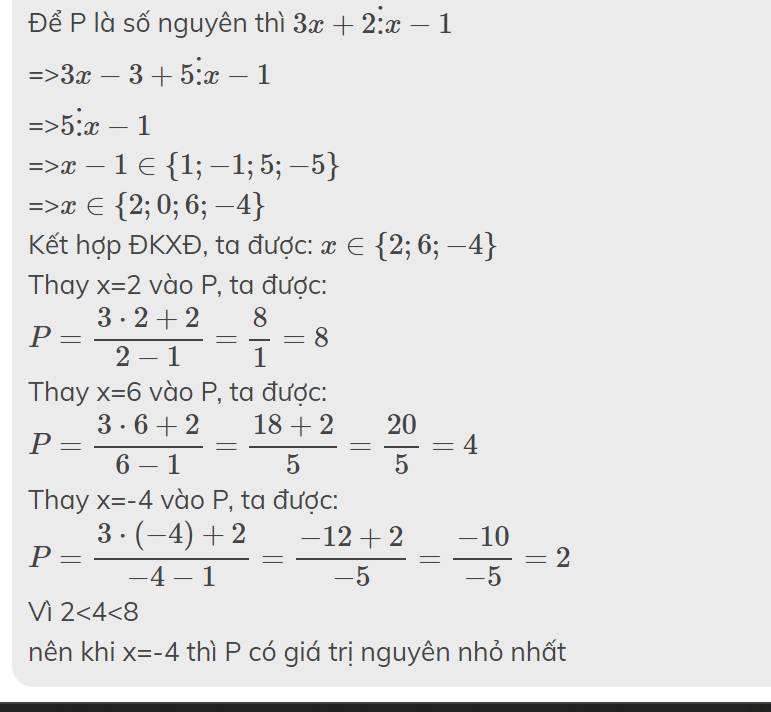Hãy nhập câu hỏi của bạn vào đây, nếu là tài khoản VIP, bạn sẽ được ưu tiên trả lời.

`a,` Với `x=3`
\(B=\dfrac{x^2-x}{2x+1}\\ \Rightarrow\dfrac{3^2-3}{2\cdot3+1}\\ =\dfrac{9-3}{6+1}\\ =\dfrac{6}{7}\)
`b,` Ta có `M=A*B`
\(M=\left(\dfrac{1}{x-1}+\dfrac{x}{x^2-1}\right)\cdot\dfrac{x^2-x}{2x+1}\\ =\left(\dfrac{1}{x-1}+\dfrac{x}{\left(x-1\right)\left(x+1\right)}\right)\cdot\dfrac{x\left(x-1\right)}{2x+\text{ }1}\\ =\left(\dfrac{x+1}{\left(x-1\right)\left(x+1\right)}+\dfrac{x}{\left(x-1\right)\left(x+1\right)}\right)\cdot\dfrac{x\left(x-1\right)}{2x+1}\\ =\dfrac{x+1+x}{\left(x-1\right)\left(x+1\right)}\cdot\dfrac{x\left(x-1\right)}{2x+1}\\ =\dfrac{2x+1}{\left(x-1\right)\left(x+1\right)}\cdot\dfrac{x\left(x-1\right)}{2x+1}\\ =\dfrac{x}{x+1}\)
`c,` Để `M=1/2`
`=> x/(x+1)=1/3`
`<=> (3x)/(3(x+1))= (x+1)/(3(x+1))`
`<=> 3x=x+1`
`<=>3x-x=1`
`<=>2x=1`
`<=>x=1/2`

c) Để P=3 thì \(\dfrac{x+1}{2x}=3\)
\(\Leftrightarrow x+1=6x\)
\(\Leftrightarrow x-6x=-1\)
\(\Leftrightarrow-5x=-1\)
hay \(x=\dfrac{1}{5}\)(thỏa ĐK)
Vậy: Để P=3 thì \(x=\dfrac{1}{5}\)
a) Ta có: \(A=\dfrac{1}{x^2+x}+\dfrac{1}{x+1}\)
\(=\dfrac{1}{x\left(x+1\right)}+\dfrac{x}{x\left(x+1\right)}\)
\(=\dfrac{x+1}{x\left(x+1\right)}=\dfrac{1}{x}\)

a) ĐKXĐ: \(x\notin\left\{0;-5\right\}\)
Ta có: \(B=\dfrac{x^2+2x}{2x+10}+\dfrac{x-5}{x}-\dfrac{5x-50}{2x^2+10x}\)
\(=\dfrac{x^2+2x}{2\left(x+5\right)}+\dfrac{x-5}{x}-\dfrac{5x-50}{2x\left(x+5\right)}\)
\(=\dfrac{x^3+2x^2}{2x\left(x+5\right)}+\dfrac{2\left(x+5\right)\left(x-5\right)}{2x\left(x+5\right)}-\dfrac{5x-50}{2x\left(x+5\right)}\)
\(=\dfrac{x^3+2x^2+2x^2-50-5x+50}{2x\left(x+5\right)}\)
\(=\dfrac{x^3+4x^2-5x}{2x\left(x+5\right)}\)
\(=\dfrac{x\left(x^2+4x-5\right)}{2x\left(x+5\right)}\)
\(=\dfrac{x^2+5x-x-5}{2\left(x+5\right)}\)
\(=\dfrac{x\left(x+5\right)-\left(x+5\right)}{2\left(x+5\right)}\)
\(=\dfrac{\left(x+5\right)\left(x-1\right)}{2\left(x+5\right)}\)
\(=\dfrac{x-1}{2}\)
b) Để B=0 thì \(\dfrac{x-1}{2}=0\)
\(\Leftrightarrow x-1=0\)
hay x=1(nhận)
Vậy: Để B=0 thì x=1
Để \(B=\dfrac{1}{4}\) thì \(\dfrac{x-1}{2}=\dfrac{1}{4}\)
\(\Leftrightarrow4\left(x-1\right)=2\)
\(\Leftrightarrow4x-4=2\)
\(\Leftrightarrow4x=6\)
hay \(x=\dfrac{3}{2}\)(nhận)
Vậy: Để \(B=\dfrac{1}{4}\) thì \(x=\dfrac{3}{2}\)
c) Thay x=3 vào biểu thức \(B=\dfrac{x-1}{2}\), ta được:
\(B=\dfrac{3-1}{2}=\dfrac{2}{2}=1\)
Vậy: Khi x=3 thì B=1
d) Để B<0 thì \(\dfrac{x-1}{2}< 0\)
\(\Leftrightarrow x-1< 0\)
\(\Leftrightarrow x< 1\)
Kết hợp ĐKXĐ, ta được:
\(\left\{{}\begin{matrix}x< 1\\x\notin\left\{0;-5\right\}\end{matrix}\right.\)
Vậy: Để B<0 thì \(\left\{{}\begin{matrix}x< 1\\x\notin\left\{0;-5\right\}\end{matrix}\right.\)
Để B>0 thì \(\dfrac{x-1}{2}>0\)
\(\Leftrightarrow x-1>0\)
hay x>1
Kết hợp ĐKXĐ, ta được: x>1
Vậy: Để B>0 thì x>1

a: Ta có: |x+4|=1
=>x+4=1 hoặc x+4=-1
=>x=-3(loại) hoặc x=-5
Khi x=-5 thì \(A=\dfrac{\left(-5\right)^2-5}{3\left(-5+3\right)}=\dfrac{20}{3\cdot\left(-2\right)}=\dfrac{-10}{3}\)
b: \(B=\dfrac{x-1+x+1-3+x}{\left(x-1\right)\left(x+1\right)}=\dfrac{3x-3}{\left(x-1\right)\left(x+1\right)}=\dfrac{3}{x+1}\)

a)Vì |4x - 2| = 6 <=> 4x - 2 ϵ {6,-6} <=> x ϵ {2,-1}
Thay x = 2, ta có B không tồn tại
Thay x = -1, ta có B = \(\dfrac{1}{3}\)
b)ĐKXĐ:x ≠ 2,-2
Ta có \(A=\dfrac{5}{x+2}+\dfrac{3}{2-x}-\dfrac{15-x}{4-x^2}=\dfrac{10-5x+3x+6}{\left(x+2\right)\left(2-x\right)}-\dfrac{15-x}{4-x^2}=\dfrac{16-2x}{\left(x+2\right)\left(2-x\right)}-\dfrac{15-x}{4-x^2}=\dfrac{2x-16}{\left(x+2\right)\left(x-2\right)}-\dfrac{15-x}{4-x^2}=\dfrac{2x-16}{x^2-4}+\dfrac{15-x}{x^2-4}=\dfrac{x-1}{x^2-4}\)c)Từ câu b, ta có \(A=\dfrac{x-1}{x^2-4}\)\(\Rightarrow\dfrac{2A}{B}=\dfrac{\dfrac{\dfrac{2x-2}{x^2-4}}{2x+1}}{x^2-4}=\dfrac{2x-2}{2x+1}< 1\) với mọi x
Do đó không tồn tại x thỏa mãn đề bài


a) ĐKXĐ: \(x\ne1\)
Ta có: \(x^2-8x+7=0\)
\(\Leftrightarrow x^2-x-7x+7=0\)
\(\Leftrightarrow x\left(x-1\right)-7\left(x-1\right)=0\)
\(\Leftrightarrow\left(x-1\right)\left(x-7\right)=0\)
\(\Leftrightarrow\left[{}\begin{matrix}x-1=0\\x-7=0\end{matrix}\right.\Leftrightarrow\left[{}\begin{matrix}x=1\left(loại\right)\\x=7\left(nhận\right)\end{matrix}\right.\)
Thay x=7 vào B, ta được:
\(B=\dfrac{1}{7-1}=\dfrac{1}{6}\)
Vậy: Khi \(x^2-8x+7=0\) thì \(B=\dfrac{1}{6}\)
b) Ta có: \(A=\dfrac{x^2+2}{x^3-1}+\dfrac{x+1}{x^2+x+1}\)
\(=\dfrac{x^2+2}{\left(x-1\right)\left(x^2+x+1\right)}+\dfrac{\left(x+1\right)\left(x-1\right)}{\left(x^2+x+1\right)\left(x-1\right)}\)
\(=\dfrac{x^2+2+x^2-1}{x^3-1}\)
\(=\dfrac{2x^2+1}{x^3-1}\)